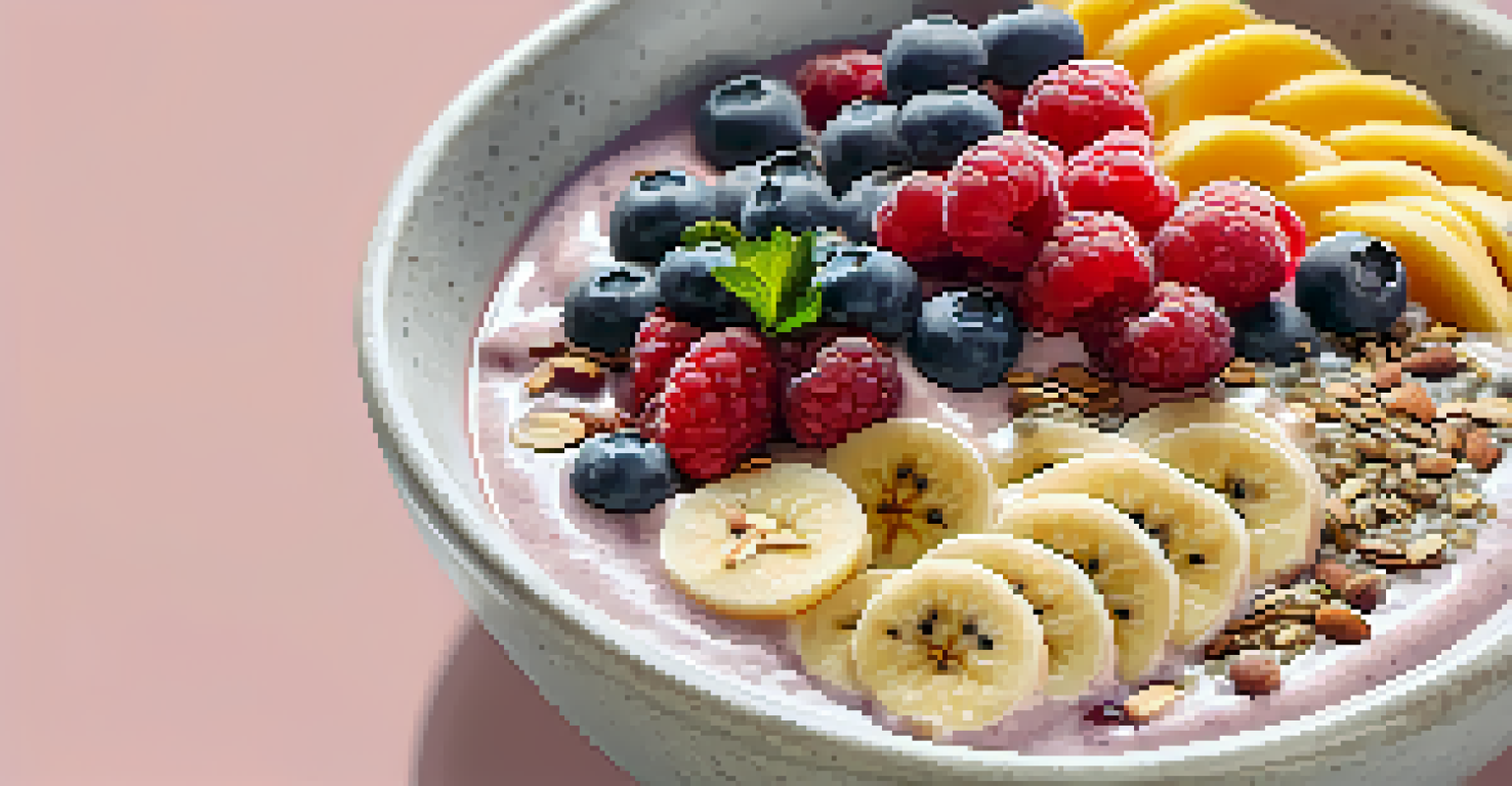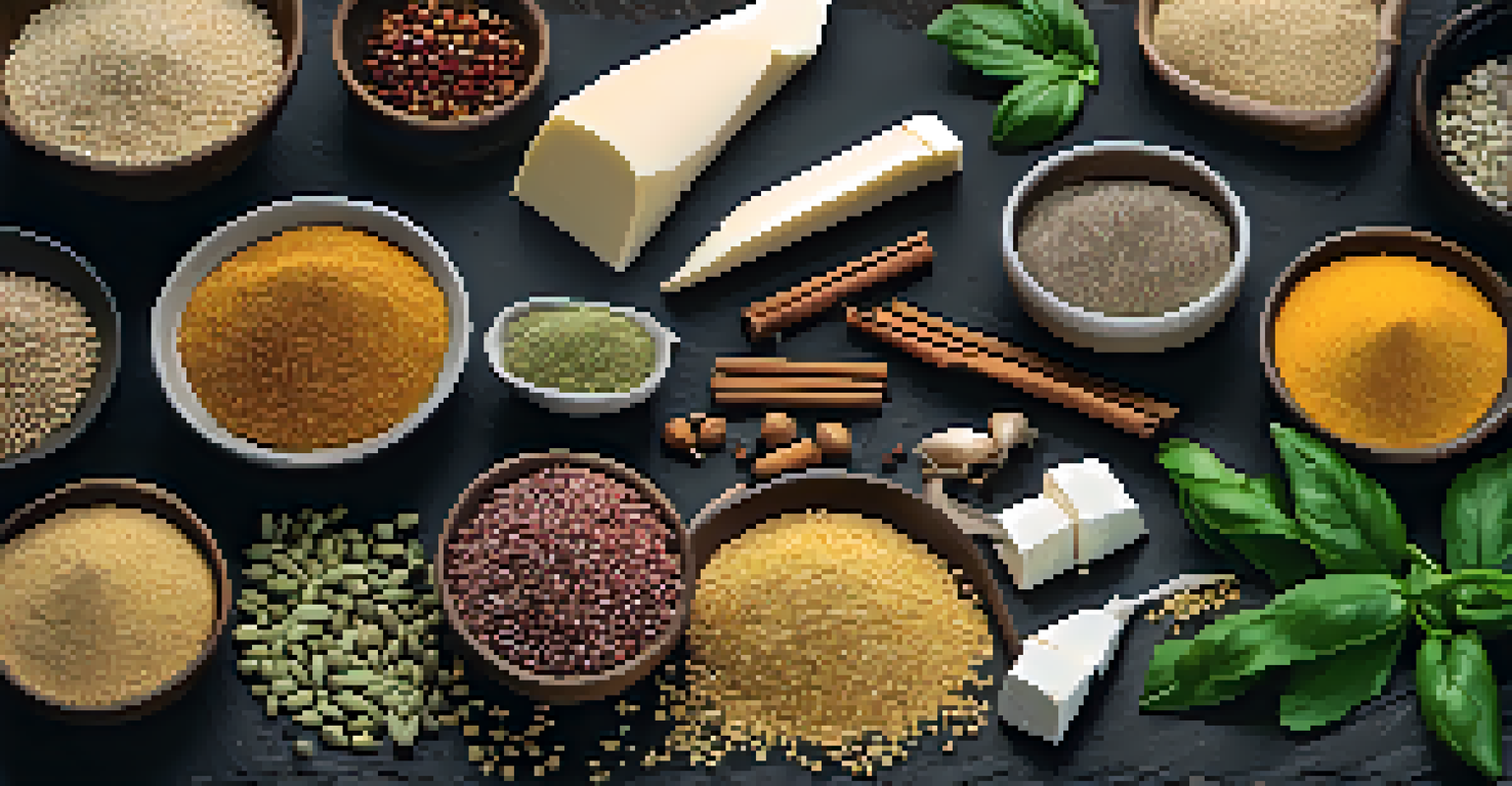Choosing the Right Plant Proteins for Muscle Building

Understanding Plant Proteins and Their Benefits
Plant proteins come from a variety of sources like beans, lentils, and nuts. They are not only rich in protein but also packed with vitamins, minerals, and fiber that are essential for overall health. Unlike animal proteins, plant proteins can offer additional benefits, such as lower cholesterol levels and reduced environmental impact.
Let food be thy medicine and medicine be thy food.
Choosing plant proteins can also contribute to muscle building, as they provide the necessary amino acids, which are the building blocks of muscle. Many people might think that only animal-based proteins can support muscle growth, but this isn’t the case. With the right combinations, plant proteins can be just as effective.
Moreover, incorporating plant proteins into your diet can lead to better digestion and a feeling of fullness, which is great if you’re looking to manage your weight while building muscle. This makes them an excellent choice for those who are not only seeking muscle gains but also a healthier lifestyle.
Key Amino Acids for Muscle Growth
Amino acids are crucial for muscle repair and growth, and there are 20 different types that our bodies need. Nine of these are essential amino acids (EAAs), meaning our bodies cannot produce them, so we must obtain them from food. It's vital to ensure your plant protein sources contain all nine EAAs for effective muscle building.

Some plant proteins, like quinoa and soy, are considered complete proteins because they contain all the essential amino acids. However, other sources, such as rice or beans, may lack one or more of these amino acids. To overcome this, you can combine different plant proteins, like eating rice and beans together, to create a complete amino acid profile.
Plant Proteins Boost Health
Plant proteins are rich in essential nutrients and can support muscle growth while promoting overall health.
Understanding the amino acid profiles of different plant proteins can help you make more informed choices. Aim for a varied diet that includes a mix of protein sources to ensure you’re getting a balanced intake of all the essential amino acids needed for muscle recovery and growth.
Popular Plant Protein Sources to Consider
There are many popular plant-based protein sources available, each with unique benefits. For instance, lentils are not only high in protein but also rich in iron and fiber, making them a great addition to your meals. Similarly, chickpeas are versatile and can be used in various dishes, from salads to hummus.
The food you eat can be either the safest and most powerful form of medicine or the slowest form of poison.
In addition to legumes, nuts and seeds pack a protein punch too. Almonds and pumpkin seeds are excellent choices, providing healthy fats alongside protein. You can easily add them to smoothies, yogurt, or snack on them directly for a nutritious boost.
Don't forget about protein powders made from plants, such as pea or hemp protein. These can be convenient for post-workout shakes, helping you meet your protein needs without much hassle. Just be sure to check the ingredient labels for any added sugars or fillers.
Balancing Plant Proteins in Your Diet
Incorporating plant proteins into your diet doesn't mean you have to eliminate animal proteins entirely. It's about finding a balance that works for you and your lifestyle. You might start by designating certain meals as plant-based, such as Meatless Mondays, to gradually increase your intake of these nutritious options.
Consider creating meals that highlight plant proteins. For example, a stir-fry with tofu, broccoli, and quinoa not only provides a complete protein source but also a host of vitamins and minerals. This way, you can enjoy delicious meals while boosting your protein intake.
Essential Amino Acids Matter
Ensuring that your plant protein sources provide all nine essential amino acids is crucial for effective muscle building.
It's also essential to listen to your body and adjust your diet based on how you feel. If you notice any changes in your energy levels or muscle recovery, tweaking your protein sources could be beneficial. Remember, it's all about what makes you feel your best.
The Role of Protein Timing and Quantity
When it comes to muscle building, both the timing and quantity of your protein intake matter. Consuming protein-rich foods or shakes after a workout can help your muscles repair and grow. Aim to eat a source of protein within 30 to 60 minutes post-exercise for optimal recovery.
As for quantity, research suggests that around 20 to 30 grams of protein per meal is effective for muscle synthesis. This doesn’t mean you should wolf down a massive protein shake; rather, spread your protein intake throughout the day to maximize its benefits. For plant-based eaters, this can be achieved through meals that incorporate various protein sources.
Don’t forget to hydrate and combine your protein with carbohydrates. This balance helps replenish your energy stores and supports muscle recovery. Think of your post-workout meal as a team effort—each nutrient plays a role in helping you reach your fitness goals.
Potential Challenges of Plant Proteins
While plant proteins offer many benefits, there can be challenges, especially for those new to a plant-based diet. One common concern is achieving sufficient protein intake, particularly for athletes or those with high physical demands. This can be addressed by planning your meals carefully and ensuring you include a variety of protein sources throughout the day.
Another challenge is digestibility. Some people may find certain legumes or grains hard to digest, leading to discomfort. Soaking beans or choosing sprouted grains can help improve digestion. Additionally, incorporating fermented foods can support gut health and make protein absorption easier.
Balance is Key in Diet
Incorporating a mix of plant and animal proteins can create a balanced diet that supports both muscle gains and health.
Lastly, be mindful of the nutritional composition of your plant proteins. Some may be lower in certain essential amino acids or come with added sugars or unhealthy fats. Always check labels if you're using protein powders or processed products, and prioritize whole foods whenever possible.
Conclusion: Choosing the Right Plant Proteins
Selecting the right plant proteins for muscle building can be a rewarding journey, leading to not only gains but also overall health benefits. By understanding your protein needs, exploring various plant sources, and ensuring a balanced diet, you’ll be well on your way to achieving your fitness goals. Remember, it's not just about protein quantity but quality as well.
As you explore plant proteins, be open to trying new foods and combinations. This exploration can make your meals more exciting and varied, preventing dietary monotony. Plus, experimenting in the kitchen can be a fun way to discover which flavors and textures you enjoy most.

Ultimately, whether you're a seasoned athlete or just starting your fitness journey, incorporating plant proteins can enhance your muscle-building efforts. Embrace the power of plants, and enjoy the journey toward a healthier, stronger you!